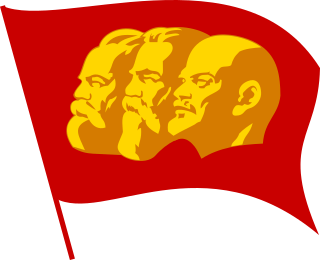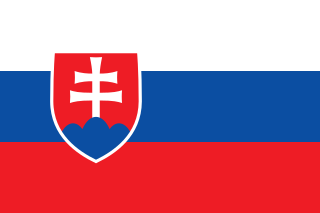
Leninism is the political theory for the organisation of a revolutionary vanguard party and the achievement of a dictatorship of the proletariat as political prelude to the establishment of socialism. Developed by and named for the Russian revolutionary Vladimir Lenin, Leninism comprises socialist political and economic theories, developed from Marxism and Lenin's interpretations of Marxist theories, for practical application to the socio-political conditions of the Russian Empire of the early 20th century.

In political science, Marxism–Leninism is the ideology established by Joseph Stalin as a synthesis of Marxism and Leninism as the official state ideology of the Soviet Union, the political parties of the Communist International after Bolshevisation, and some contemporary communist parties, such as the Party for Socialism and Liberation and the Communist Party of Cuba. Combining the political praxis of Vladimir Lenin and the political and economic theories of Karl Marx, the goal of Marxism–Leninism is a two-stage revolution from a capitalist state to a socialist state, guided by the leadership of a vanguard party of professional revolutionaries drawn from the proletariat; the vanguard party establishes the dictatorship of the proletariat and determines policy with democratic centralism.

Maoism, known in China as Mao Zedong Thought, is a communist political theory derived from the teachings of the Chinese political leader Mao Zedong, whose followers are known as Maoists. Developed from the 1950s until the Deng Xiaoping reforms in the 1970s, it was widely applied as the guiding political and military ideology of the Communist Party of China and as theory guiding revolutionary movements around the world. A key difference between Maoism and other forms of Marxism–Leninism is that peasants should be the bulwark of the revolutionary energy, led by the working class in China.

The Communist Party of Czechoslovakia was a Communist and Marxist–Leninist political party in Czechoslovakia that existed between 1921 and 1992. It was a member of the Comintern. Between 1929 and 1953 it was led by Klement Gottwald. After its election victory in 1946 it seized power in the 1948 Czechoslovak coup d'état and established a one-party state allied with the Soviet Union. Nationalization of virtually all private enterprises followed.
A political international is a transnational organization of political parties having similar ideology or political orientation. The international works together on points of agreement to co-ordinate activity.
The Workers Educational Society Napred was a socialist organization founded in Slovakia in February 1869. It was under the direct influence of a similar organization in Vienna. Napred represented the first emergence of the socialist movement in Slovakia.
Brno Noppeisen was a bilingual workers newspaper issued in Brno in the 1870s. Brno Noppeisen was published jointly by German and Czech socialists in the city.
Czechoslovak Communist Party in Russia was a Czechoslovak section of the Russian Communist Party (bolsheviks), founded by Czechoslovak left-wing Social Democrats living in Russia. The Czechoslovak Communist Party in Russia held its founding congress in Moscow May 25–29, 1918. Largely, the organization consisted of Czechoslovak prisoners of war. Alois Muna was the chairman of the Czechoslovak Communist Party in Russia.

The Marxist Left in Slovakia and the Transcarpathian Ukraine was a political organisation in eastern Czechoslovakia. It was one of the forerunners of the Communist Party of Czechoslovakia.
The Independent Socialist Party was a political party in Czechoslovakia. The party was founded in March 1923. The party included a number of former anarchists, who had joined the Czech Socialist Party in 1918. They had however been expelled from the Czechoslovak Socialist Party in 1923, as they opposed the Defense of the Republic Act. In the Czechoslovak National Assembly, the Independent Socialists formed a joint parliamentary group together with the Independent Radical Social Democratic Party of V. Brodecký. The two groups were set to merge, but Brodecký's group decided to merge with the Czechoslovak Social Democratic Workers Party. The Independent Socialist Party took the name Independent Socialist Workers Party at a congress in June 1924.
The Left Front was an organization of left-wing intellectuals in Czechoslovakia, founded in 1929 on the initiative of the Communist Party of Czechoslovakia.

Czechoslovakia–Soviet Union relations refers to the foreign relations between the former states of Czechoslovakia and the Soviet Union.

Ho Chi Minh Thought is the political philosophy of the Communist Party of Vietnam. Since 1991, the contents of Ho Chi Minh's thought were formed and developed in association with the periods of Ho Chi Minh's activities in the revolutionary movement of Vietnam and internationally as integral to the curriculum of fundamental instruction for civil servants in Vietnam.

Anti-revisionism is a position within Marxism–Leninism which emerged in the 1950s in opposition to the reforms of Soviet leader Nikita Khrushchev. Where Khrushchev pursued an interpretation of Leninism that differed from his predecessor Joseph Stalin, the anti-revisionists within the international communist movement remained dedicated to Stalin's ideological legacy and criticized the Soviet Union under Khrushchev and his successors as state capitalist and social imperialist due largely to its hopes of achieving peace with the United States. The term "Stalinism" is also used to describe these positions, but it is often not used by its supporters who opine that Stalin simply synthesized and practiced Leninism.
Marxism–Leninism–Maoism, formerly known as Marxism–Leninism–Mao Zedong Thought, is a political philosophy that builds upon Marxism–Leninism and some aspects of Mao Zedong Thought which was first formalised in 1993 by the Revolutionary Internationalist Movement.

The Marx–Engels–Lenin Institute, established in Moscow in 1919 as the Marx–Engels Institute, was a Soviet library and archive attached to the Communist Academy. The institute was later attached to the governing Central Committee of the Communist Party of the Soviet Union and served as a research center and publishing house for officially published works of Marxist doctrine.

František Ladislav Chleborád (1839–1911) was a Czech economist and early supporter of worker cooperatives to solve the problem of lack of capital amongst Czech entrepreneurs. In the 1860s and '70s, he argued in the Czech newspapers Delnik and Delnicky Listy for nationalist socialism and cooperation between Czech employers and workers.









